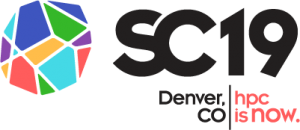Welcome to the PAW-ATM Workshop.
- Proceedings
- Program
- Important dates
- Summary
- Scope and Aims
- Topics
- Submissions
- Organization
- Contact
- Previous Workshops
Program
- 9:00 - 9:10 Karla Morris, Rosa M. Badia, Bradford L. Chamberlain, Sean Treichler,
Bill Long, and Francesco Rizzi
Introduction
(Presentation)
- 9:10 - 10:00 Keynote Speaker: Peter J. Braam - University of Oxford
Computer Science Challenges to Imaging the Universe with the SKA Radio-Telescope
(Abstract,
Presentation)
- 10:00 - 10:30 Break
- 10:30 - 11:30 Session 1: Scientific Simulations
- 10:30 - 10:50 Hilario C. Torres, Manolis Papadakis, Lluis Jofre, Wonchan Lee,
Alex Aiken and Gianluca Iaccarino
Soleil-X: Turbulence, Particles, and Radiation in the Regent Programming Language
(Presentation ,
Extended Abstract)
- 10:50 - 11:10 Ethan T. Coon, Wael Elwasif, Himanshu Pillai,
Peter E. Thornton and Scott L. Painter
Exploring the Use of Novel Programming Models in Land Surface Models
(Presentation)
- 11:10 - 11:30 Nikhil Padmanabhan, Elliot Ronaghan, Jovana L. Zagorac, and Richard Easther
Simulating Ultralight Dark Matter with Chapel: An Experience Report
(Presentation ,
Extended Abstract)
- 11:30 - 12:30 Session 2: Applying MPI+X Alternatives: from Shallow Water to Deep Learning
- 11:30 - 11:50 Alexander Pöppl, Scott Baden, and Michael Bader
A UPC++ Actor Library and Its Evaluation On a Shallow Water Proxy Application
(Presentation)
- 11:50 - 12:10 Yu Pei, George Bosilca, Ichitaro Yamazaki, Akihiro Ida, and Jack Dongarra
Evaluation of Programming Models to Address Load Imbalance on Distributed Multi-Core CPUs:
A Case Study with Block Low-Rank Factorization
(Presentation)
- 12:10 - 12:30 Gerard Taylor, James Dinan, Md. Wasi-ur Rahman, and David Ozog
Scalable Machine Learning with OpenSHMEM
(Presentation ,
Extended Abstract)
- 12:30 - 2:00 Lunch
- 2:00 - 3:00 Session 3: Communication Libraries and APIs
- 2:00 - 2:20 David Ozog, MD Wasi-ur- Rahman, Gerard Taylor, and James Dinan
Designing, Implementing, and Evaluating the Upcoming OpenSHMEM Teams API
(Presentation)
- 2:20 - 2:40 Wenbin Lu, Tony Curtis, and Barbara Chapman
Enabling Low-Overhead Communication in Multi-threaded OpenSHMEM Applications using Contexts
(Presentation)
- 2:40 - 3:00 Paul H. Hargrove, and Dan Bonachea
Efficient Active Message RMA in GASNet Using a Target-Side Reassembly Protocol
(Presentation ,
Extended Abstract)
- 3:00 - 3:30 Break
- 3:30 - 4:10 Session 4: Integrating Python into HPC
- 3:30 - 3:50 Elliott Slaughter, and Alex Aiken
Pygion: Flexible, Scalable Task-Based Parallelism with Python
(Presentation)
- 3:50 - 4:10 Michael H. Merrill, William Reus, and Timothy Neumann
Arkouda: NumPy-like arrays at massive scale backed by Chapel
(Presentation ,
Extended Abstract)
- 4:10 - 5:30 Panel Discussion: Applications in Alternatives to MPI+X
Panel Chair: Patrick McCormick — Los Alamos National Laboratory
Panelists:
- Alex Aiken - Stanford University (Intro Slides)
- Rosa M. Badia - Barcelona Supercomputing Center (Intro Slides)
- Michael H. Merrill - U.S. Department of Defense
- Michael Ferguson - Cray, a Hewlett Packard Enterprise company (Intro Slides)
- Damian W. I. Rouson - Sourcery Institute (Intro Slides)
Bill Long, and Francesco Rizzi
Introduction
Computer Science Challenges to Imaging the Universe with the SKA Radio-Telescope
- 10:30 - 10:50 Hilario C. Torres, Manolis Papadakis, Lluis Jofre, Wonchan Lee,
Alex Aiken and Gianluca Iaccarino
Soleil-X: Turbulence, Particles, and Radiation in the Regent Programming Language
(Presentation ,
Extended Abstract)
- 10:50 - 11:10 Ethan T. Coon, Wael Elwasif, Himanshu Pillai,
Peter E. Thornton and Scott L. Painter
Exploring the Use of Novel Programming Models in Land Surface Models
(Presentation)
- 11:10 - 11:30 Nikhil Padmanabhan, Elliot Ronaghan, Jovana L. Zagorac, and Richard Easther
Simulating Ultralight Dark Matter with Chapel: An Experience Report
(Presentation ,
Extended Abstract)
- 11:30 - 11:50 Alexander Pöppl, Scott Baden, and Michael Bader
A UPC++ Actor Library and Its Evaluation On a Shallow Water Proxy Application
(Presentation)
- 11:50 - 12:10 Yu Pei, George Bosilca, Ichitaro Yamazaki, Akihiro Ida, and Jack Dongarra
Evaluation of Programming Models to Address Load Imbalance on Distributed Multi-Core CPUs:
A Case Study with Block Low-Rank Factorization
(Presentation)
- 12:10 - 12:30 Gerard Taylor, James Dinan, Md. Wasi-ur Rahman, and David Ozog
Scalable Machine Learning with OpenSHMEM
(Presentation ,
Extended Abstract)
- 2:00 - 2:20 David Ozog, MD Wasi-ur- Rahman, Gerard Taylor, and James Dinan
Designing, Implementing, and Evaluating the Upcoming OpenSHMEM Teams API
(Presentation)
- 2:20 - 2:40 Wenbin Lu, Tony Curtis, and Barbara Chapman
Enabling Low-Overhead Communication in Multi-threaded OpenSHMEM Applications using Contexts
(Presentation)
- 2:40 - 3:00 Paul H. Hargrove, and Dan Bonachea
Efficient Active Message RMA in GASNet Using a Target-Side Reassembly Protocol
(Presentation ,
Extended Abstract)
- 3:30 - 3:50 Elliott Slaughter, and Alex Aiken
Pygion: Flexible, Scalable Task-Based Parallelism with Python
(Presentation)
- 3:50 - 4:10 Michael H. Merrill, William Reus, and Timothy Neumann
Arkouda: NumPy-like arrays at massive scale backed by Chapel
(Presentation ,
Extended Abstract)
Panelists:
- Alex Aiken - Stanford University (Intro Slides)
- Rosa M. Badia - Barcelona Supercomputing Center (Intro Slides)
- Michael H. Merrill - U.S. Department of Defense
- Michael Ferguson - Cray, a Hewlett Packard Enterprise company (Intro Slides)
- Damian W. I. Rouson - Sourcery Institute (Intro Slides)
Important dates
- Submission Deadline:
July 31, 2019 August 15, 2019
- Author Notification:
September 1, 2019 September 15, 2019
- Camera Ready: October 1, 2019
- Workshop Date: November 17, 2019
Summary
Supercomputers are becoming increasingly complex due to the prevalence of hierarchy and heterogeneity in emerging node and system architectures. As a result of these trends, users of conventional programming models for scalable high-performance applications increasingly find themselves writing applications using a mix of distinct programming models—such as Fortran90, C, C++, MPI, OpenMP, and CUDA—which are also often becoming more complex and detail-oriented themselves. These trends negatively impact the costs of developing, porting, and maintaining HPC applications.
Meanwhile, new programming models and languages are being developed that strive to improve upon the status quo. This is accomplished by unifying the expression of parallelism and locality across the system, raising the level of abstraction, making use of modern language design features, and/or leveraging the respective strengths of programmers, compilers, runtimes, and operating systems. These alternatives may take the form of parallel programming languages (e.g., Chapel, Fortran 2018, Julia, UPC), frameworks for large-scale data processing and analytics (e.g., Spark, Tensorflow, Dask), or libraries and embedded DSLs that extend existing languages (e.g., Legion, COMPSs, SHMEM, HPX, Charm++, UPC++, Coarray C++, Global Arrays).
The PAW-ATM workshop is designed to explore the expression of applications in scalable parallel programming models that serve as an alternative to the status quo. It is designed to bring together applications experts and proponents of high-level programming models to present concrete and practical examples of using such alternative models and to illustrate the benefits of high-level approaches to scalable programming.
Scope and Aims
The PAW-ATM workshop is designed as a forum for exhibiting studies of parallel applications developed using high-level parallel programming models serving as alternatives to MPI+X-based programming. We encourage the submission of papers and talks that describe practical distributed-memory applications written using alternatives to MPI+X, and include characterizations of scalability and performance, expressiveness and programmability, as well as any downsides or areas for improvement in such models. Our hope is to create a forum in which architects, language designers, and users can present, learn about, and discuss the state of the art in alternative scalable programming models while also wrestling with how to increase their effectiveness and adoption. Beyond well-established HPC scientific simulations, we also encourage submissions exploring artificial intelligence, big data analytics, machine learning, and other emerging application areas.
Topics
Topics include, but are not limited to:
- Novel application development using high-level parallel programming languages and frameworks.
- Examples that demonstrate performance, compiler optimization, error checking, and reduced software complexity.
- Applications from artificial intelligence, data analytics, bioinformatics, and other novel areas.
- Performance evaluation of applications developed using alternatives to MPI+X and comparisons to standard programming models.
- Novel algorithms enabled by high-level parallel abstractions.
- Experience with the use of new compiler and runtime environments.
- Libraries using or supporting alternatives to MPI+X.
- Benefits of hardware abstraction and data locality on algorithm implementation.
Submissions
Submissions are solicited in two categories:
Full-length papers will be published in the workshop proceedings in cooperation with IEEE TCHPC (pending acceptance). Submitted papers must describe original work that has not appeared in, nor is under consideration for, another conference or journal. Papers shall be eight (8) pages minimum and not exceed ten (10) including text, appendices, and figures. Appendix pages related to the reproducibility initiative dependencies, namely the Artifact Description (AD) and Artifact Evaluation (AE), are not included in the page count.
Extended abstracts will be evaluated separately and will not be included in the published proceedings; they are intended to propose timely communications of novel work that will be formally submitted elsewhere at a later stage, and/or of already published work that would be of interest to the PAW-ATM audience in terms of topic and timeliness. Extended abstracts shall not exceed four (4) pages.
When deciding between submissions with similar merit, ties will be broken by giving weight to full-length paper submissions over extended abstracts. In addition, submissions whose focus relates more directly to the key themes of the workshop (application studies, computing at scale, high-level alternatives to MPI+X) will be given priority over those that don’t.
Submissions shall be submitted through Linklings using 10pt font in the IEEE format.PAW-ATM follows the reproducibility initiative of SC19. For more information, please refer to the FAQ provided for additional information.
AD/AE templates are avaliable.Organization
Workshop Chair
- Karla Morris - Sandia National Laboratories
Organizing Committee
- Rosa M. Badia - Barcelona Supercomputing Center
- Bradford L. Chamberlain - Cray, a Hewlett Packard Enterprise company
- Sean Treichler - NVIDIA
Program Committee Chairs
- Bill Long - Cray, a Hewlett Packard Enterprise company
- Francesco Rizzi - NexGen Analytics
Program Committee
- Olivier Aumage - Inria
- Rosa M. Badia - Barcelona Supercomputing Center
- Vicenç Beltran - Barcelona Supercomputing Center
- John Biddiscombe - CSCS Swiss National Supercomputing Centre
- Bradford L. Chamberlain - Cray, a Hewlett Packard Enterprise company
- Salvatore Filippone - Cranfield University
- Marta G. Gasulla - Barcelona Supercomputing Center
- Magne Haveraaen - University of Bergen
- Costin Iancu - Lawrence Berkeley National Laboratory
- Laxmikant Kale - University of Illinois
- Karla Morris - Sandia National Laboratories
- Bill Long - Cray, a Hewlett Packard Enterprise company
- Swaroop S. Pophale - Oak Ridge National Laboratory
- Jason Riedy - Georgia Institute of Technology
- Francesco Rizzi - NexGen Analytics
- Mitsuhisa Sato - RIKEN Advanced Institute for Computational Science
- Elliott Slaughter - SLAC National Accelerator Laboratory
- Sean Treichler - NVIDIA
Advisory Committee
- Salvatore Filippone - Cranfield University
- Katherine A. Yelick - Lawrence Berkeley National Laboratory
- Damian W. I. Rouson - Sourcery Institute
Contact
In case of questions please email us at: paw-atm@cranfield.ac.uk


